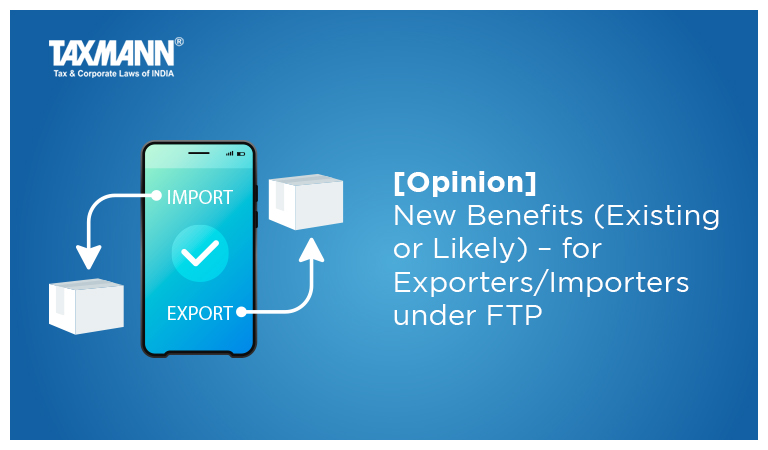[Opinion] New Benefits (Existing or Likely) – for Exporters/Importers under FTP
- Blog|News|GST & Customs|
- 2 Min Read
- By Taxmann
- |
- Last Updated on 23 August, 2022

S.S. Gupta – [2022] 141 taxmann.com 339 (Article)
The Government of India notifies Foreign Trade Policy (FTP) in every five years under the Foreign Trade (Development and Regulation) Act, 1992. The last Foreign Trade Policy was notified in 2015 for the period from 2015-20, which is now extended upto 30 September 2022. Some of the incentives provided in FTP do not comply with guideline of WTO. It is expected that the Government will notify the new FTP anytime before 30 September 2022.
In this article, we have briefly covered the major benefits available under the FTP 2015-20 and the key subsequent developments/ changes from the Foreign Trade Perspective.
1. Overview of the schemes under FTP
The key schemes available under the Foreign Trade Policy are as listed below:
(a) Exports from India Scheme:
The key schemes covered for exports of merchandise and services were Merchandise Exports from India Scheme (MEIS) and Service Exports from India Scheme (SEIS) respectively.
The benefit under MEIS scheme has been discontinued from 1 January 2021 and the new duty remission schemes namely Remission of Duties and Taxes on Exported Products (RoDTEP). Similarly, the Government had last notified rates for SEIS for services exports made in 2019-20.
(b) Duty Exemption/ Remission schemes:
The key schemes covered are Advance Authorisation (AA), Duty free Import Authorisation (DFIA), Duty Remission scheme like Duty drawback scheme, RoDTEP, Rebate on State and Central Taxes and Levies (RoSTCL) and Rebate of State Levies (RoSL).
These schemes enable duty free import of inputs for export production including replenishment of inputs or duty remission.
(c) Export Promotion Capital Goods (EPCG) scheme:
This scheme facilitates import of capital goods to manufacturer/service provider at zero customs duty subject to incremental export obligations equal to six times of duty saved.
(d) Export Oriented Units Scheme and Sector-Specific schemes:
Under these schemes, the companies can set-up units for export of goods/ services. The units enjoy duty exemption benefits on import of goods and certain other benefits like deemed exports to EOU.
2. Objection of WTO
The World Trade Organization (WTO) has ruled1 against some of the schemes like SEZ, DFIS, EOU, EPCG, MEIS in a trade dispute with the US. The WTO Panel found that each of the challenged subsidies was contingent in law upon export performance, and therefore prohibited by Art. 3.1(a) the Agreement on Subsidies and Countervailing Measures. The WTO has asked India to withdraw the prohibited subsidies. India has challenged the decision of WTO Panel before the Appellate Body.
Click Here To Read The Full Article
Disclaimer: The content/information published on the website is only for general information of the user and shall not be construed as legal advice. While the Taxmann has exercised reasonable efforts to ensure the veracity of information/content published, Taxmann shall be under no liability in any manner whatsoever for incorrect information, if any.

Taxmann Publications has a dedicated in-house Research & Editorial Team. This team consists of a team of Chartered Accountants, Company Secretaries, and Lawyers. This team works under the guidance and supervision of editor-in-chief Mr Rakesh Bhargava.
The Research and Editorial Team is responsible for developing reliable and accurate content for the readers. The team follows the six-sigma approach to achieve the benchmark of zero error in its publications and research platforms. The team ensures that the following publication guidelines are thoroughly followed while developing the content:
- The statutory material is obtained only from the authorized and reliable sources
- All the latest developments in the judicial and legislative fields are covered
- Prepare the analytical write-ups on current, controversial, and important issues to help the readers to understand the concept and its implications
- Every content published by Taxmann is complete, accurate and lucid
- All evidence-based statements are supported with proper reference to Section, Circular No., Notification No. or citations
- The golden rules of grammar, style and consistency are thoroughly followed
- Font and size that’s easy to read and remain consistent across all imprint and digital publications are applied



 CA | CS | CMA
CA | CS | CMA
